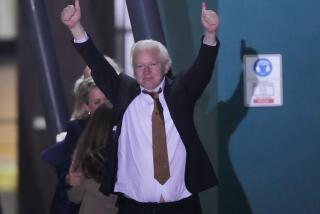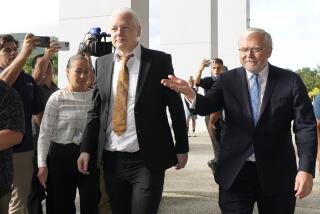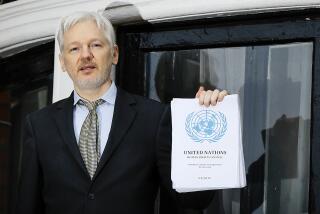Julian Assange dodged Swedish investigators, prosecutor says
- Share via
Reporting from London — WikiLeaks founder Julian Assange continually avoided interview requests from Swedish authorities who wanted to question him about allegations that he sexually abused two women last summer, a British prosecutor said Tuesday.
Assange’s apparent reluctance to be interviewed made him a flight risk and justified the move to arrest him, a London courtroom heard on the second day of a hearing to decide whether the 39-year-old Australian should be extradited from Britain to Sweden.
But Assange’s lawyers said their client was difficult to reach not out of a desire to avoid interrogation but because he essentially went underground in September after his website leaked thousands of U.S. military documents and sparked official condemnation and threats of retaliation.
Prosecutors in Stockholm want Assange sent back to Sweden so they can investigate allegations by two women who accuse him of molestation and rape on separate occasions in August. The website founder, who surrendered to British police two months ago on a European arrest warrant, said the sex was consensual.
His defense team continued to argue Tuesday that Assange was the subject of a witch hunt by overzealous prosecutors captive to their own agendas. Assange also blames external pressure, especially from the United States, rooted in anger over WikiLeaks’ revelation of documents from the Pentagon and the U.S. State Department.
Geoffrey Robertson, Assange’s lead attorney, accused Swedish authorities of leaking his client’s name to the news media and prejudicing public opinion against him when the allegations first surfaced.
Drawing laughter during an otherwise testy hearing, Robertson also faulted Swedish prosecutor Marianne Ny’s office for not providing his client with documents in the case in a language he could understand, either in English or “in Australian.”
Outside the courtroom, Assange tried to turn the tables on his pursuers, criticizing Ny for not coming to London to be questioned at the hearing.
In other testimony, Sven-Erik Alhem, a former Swedish prosecutor called by the defense, said Assange should have been allowed to be questioned in Britain but that, if he were Assange, he would hurry back to Sweden to clear his name.
Alhem also said that extraditing Assange from Sweden to the U.S. would be almost impossible, if only because it would create a “media storm.”
The hearing, which had been scheduled to conclude Tuesday, is now due to wrap up Friday. The judge’s decision could take days.
Stobart is a staff writer in The Times’ London Bureau.
More to Read
Sign up for Essential California
The most important California stories and recommendations in your inbox every morning.
You may occasionally receive promotional content from the Los Angeles Times.











